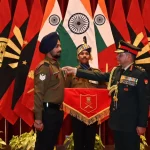This week marked significant developments in Indian politics and defense, with the Ministry of Defence granting clearance for the Twin Engine Deck-Based Fighter (TEDBF) project. This initiative is considered pivotal for enhancing the capabilities of the Indian Navy and ensuring the nation does not repeat the challenges faced with the Tejas aircraft program.
In a concerning incident, a foiled assassination attempt on Sukhbir Singh Badal highlighted the growing threat of radicalism within the political landscape. The incident serves as a stark reminder of the dangers posed by extreme political ideologies that undermine democratic values.
In Maharashtra, Devendra Fadnavis was sworn in as Chief Minister for the third time, a move that many view as justified given his previous contributions. Stakeholders are hopeful that he will take a collaborative approach with his deputies, treating them as equal partners in governance.
Reports from Uttar Pradesh and Bihar indicate a troubling trend of vulgarization in family entertainment, notably through explicit dance shows that have particularly affected women and girls. This situation raises concerns about societal values and the safety of women in such contexts.
The Reserve Bank of India’s recent decision to keep interest rates unchanged has left analysts puzzled. The focus on controlling inflation without considering other economic factors has sparked debate about the implications of such a narrow approach on the broader economy.
On the international front, South Korea’s parliament rejected calls for emergency powers, contrasting with India’s historical challenges during times of political unrest. Furthermore, Pakistan’s nine-year plan to modernize its naval capabilities is being viewed as a wake-up call for Indian defense strategists, who must remain vigilant and proactive in response to regional developments.
In the United States, former President Trump’s tariff threats aimed at China further complicate global trade dynamics. India’s leadership is cautiously navigating this landscape, aware that aggressive rhetoric could have significant repercussions.
Lastly, Aam Aadmi Party’s decision to proceed independently in Delhi following Congress’s previous actions in Haryana has been interpreted as a strategic move in the evolving political scenario, reflecting shifting alliances and power dynamics within Indian politics.













